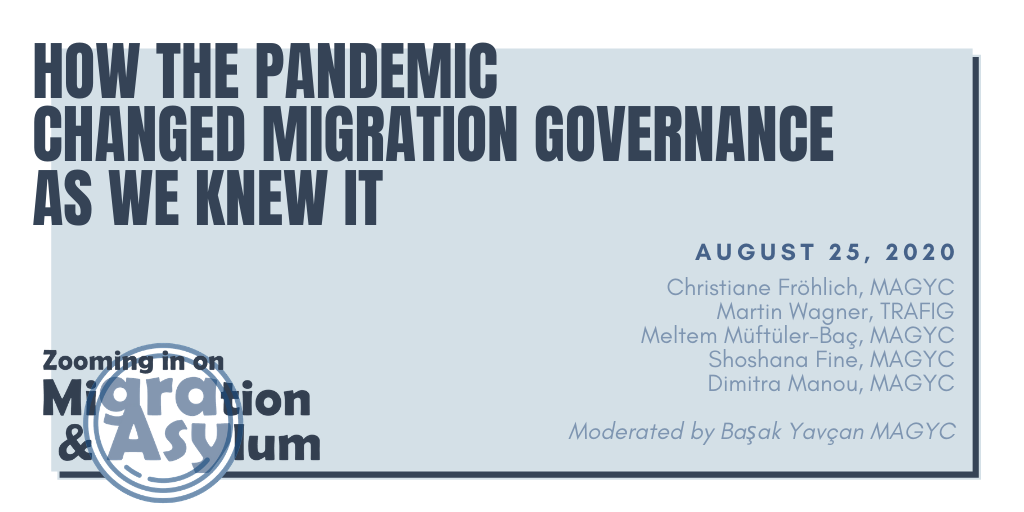#2: How the Pandemic changed Migration Governance as we knew it

25. August 2020, 13:00 - 14:30 CET
Two months after the first COVID-19 cases had been reported in China, WHO declared a pandemic on March 11th, 2020, due to the alarming levels of spread and severity across the world and the alarming levels of inaction. In the midst of the pandemic, the MAGYC research team has been exploring how migration governance has been influenced by the “Syrian refugee crisis”, and how crises at large shape policy responses, focusing on migration ‘crises’ which are a product of both an acceleration and a concentration of migration. In this webinar, our researchers reflect on the impact of the COVID-19 Pandemic both on their work and on migration governance within the contexts covered by the MAGYC project. Possible themes include:
At the Macro level:
- How does the COVID-19 Crisis compare to the ‘migration crises’ in terms of its construction and governance?
- How has international cooperation and coordination (or the lack thereof) evolved to mitigate the impact of the pandemic on migrants and forcibly displaced people?
- Has the pandemic affected EU foreign policy on migration vis-à-vis third countries such as Turkey, Jordan, Lebanon, and Egypt?
- How did countries in North Africa, Middle East, Greater Horn of Africa experience the pandemic in relation to pre-existing (migration) crises?
At the Meso level:
- When faced with the Pandemic, what were the state level and local policy responses in the counties covered by MAGYC? Were there differences between state and non-state actors?
- How have perceptions of migrants, e.g. in images, policy discourses, media portrayals, been impacted in EU member and partner states?
At the Micro level:
- How has the pandemic affected the displacement continuum in terms of livelihoods as a result of closing borders and shrinking humanitarian aid?
- How did the pandemic affect basic protection priorities/welfare of migrants as well as internally and externally displaced in the countries covered, in terms of access to basic services, clean water, hygiene, health services, education and formal labor market access?
Facilitator: H2020 project Migration Governance and Asylum Crises (MAGYC)
Moderation and host: Başak Yavçan, University of Liège on behalf of MAGYC
Invited speakers:
- Christiane Fröhlich, GIGA Institute for Middle East Studies on behalf of MAGYC
- Martin Wagner, ICMPD (International Center for Migration Policy Development) on behalf of TRAFIG
- Meltem Müftüler-Baç, Sabancı University on behalf of MAGYC
- Shoshana Fine, Sciences Po on behalf of MAGYC
- Dimitra Manou, Aristotle University of Thessaloniki onbehalf of MAGYC
You can register for the webinar series here. You will receive a confirmation email upon registration.